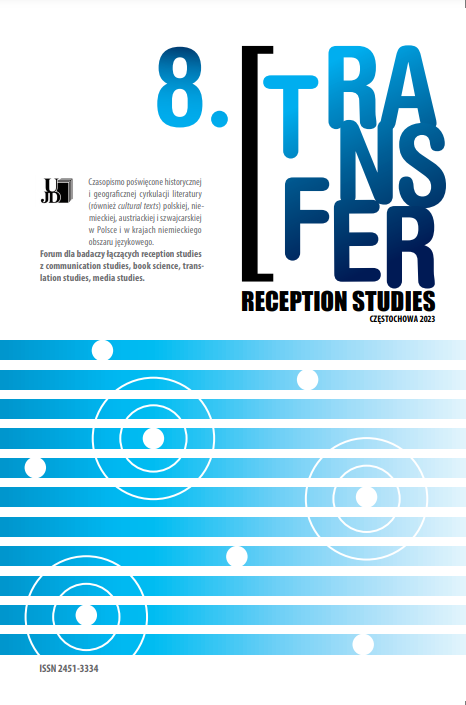Is the Russian Luna the Same as Polish Księżyc? Sense and Nonsense in Translation and Reception of Grammatical Gender
Edyta Manasterska-Wiącek
edyta.manasterska-wiacek@mail.umcs.plMaria Curie-Skłodowska University in Lublin (Poland)
Abstract
The purpose of this article is to investigate the importance of grammatical gender in conveying meaning and what difficulties this grammatical category can cause for translators. For the purpose of the study, a fairy tale was created in Russian, the axis of which is grammatical gender, which affects the meaning of the text. Interestingly, all nouns of a given gender in the original correspond in the translation to equivalents that are relevant to the story but are of
a different gender. The change of gender modifies the message of the fairy tale, and inconsistency in its use disrupts the meaning of the story. In order to see what consequences the decisions made by the translators have on the reader’s reception, three translations produced by students of Russian Studies were subjected to audience evaluation. As a result of this experiment, it was found that grammatical gender determines the physical and psychological characteristics of the characters and their behaviour, contributes to the creation of the world depicted, affects the reception of the text, and is thus a category that cannot be used unreflectively.
Keywords:
grammatical gender in translation, translation for children, gender in translation, Polish, RussianReferences
References
Dąbrowska, Anna, Urszula Dobosz, and Małgorzata Pasieka. Co warto wiedzieć. Poradnik metodyczny dla nauczycieli języka polskiego jako obcego na Wschodzie. Ośrodek Rozwoju Edukacji, Warszawa 2010. Google Scholar
Jurkowski, Marian. “Rodzaj gramatyczny rzeczowników obcego pochodzenia w języku polskim i ukraińskim.” Prace Filologiczne, vol. XLII (1997): 81–90. Google Scholar
Kępińska, Alina. Kształtowanie się polskiej kategorii męsko- i niemęskoosobowości. Uniwersytet Warszawski, Warszawa 2006. Google Scholar
Komorowska, Hanna. Metodyka nauczania języków obcych. Wydawnictwo Fraszka Edukacyjna, Warszawa 2005. Google Scholar
Krawczuk, Ałła. “Gramatyczna kategoria rodzaju w języku polskim i ukraińskim: paralele i kontrasty a glottodydaktyka.” Rozprawy Komisji Językowej Łódzkiego Towarzystwa Naukowego, vol. LVIII (2012): 151–167. Google Scholar
Kwiatkowska, Tatiana. “Gramatyczna kategoria rodzaju dla zapożyczeń w języku polskim: paralele i różnice.” Acta Polono-Ruthenica 19 (2014): 217–229. Google Scholar
Lipiarz, Adrianna. “Różnice w przyjaźni między kobietami a mężczyznami.” EUPHIRE, January 10, 2022. https://euphire.pl/artykul/kobieca-i-meska-przyjazn-czym-sie-roznia/ . Google Scholar
Lubocha-Kruglik, Jolanta. “Co nam przeszkadza w tłumaczeniu, czyli jeszcze o barierach w przekładzie.” In Przestrzenie przekładu, edited by Jolanta Lubocha-Kruglik, and Oksana Małysa, 13–29. Katowice: Wydawnictwo Uniwersytetu Śląskiego, 2016. Google Scholar
Pałuszyńska, Edyta. “Kategoria rodzaju gramatycznego w systemie językowym, dyskursie i glottodydaktyce.” Acta Universitatis Lodziensis. Kształcenie Polonistyczne Cudzoziemców, eds. Grażyna Zarzycka, Beata Grochala, and Iwona Dembowska-Wosik, vol. 26 (2019): 413–423. http://dx.doi.org/10.18778/0860-6587.26.28 Google Scholar
Seretny, Anna. Stefańczyk, Wiesław T. “Współczesne ujęcia kategorii rodzaju gramatycznego w polszczyźnie a praktyka (glotto)dydaktyczna – wprowadzenie.” Postscriptum Polonistyczne 1 (19) (2017): 72–85. Google Scholar
Stefańczyk, Wiesław T. Kategoria rodzaju i przypadka polskiego rzeczownika. Próba synchronicznej analizy morfologicznej. Wydawnictwo UJ, Kraków 2007. Google Scholar
Stefańczyk, Wiesław T. “Rodzaj gramatyczny w polszczyźnie i w językach wschodniosłowiańskich. Rozważania na marginesie biernika.” Acta Universitatis Lodziensis. Kształcenie Polonistyczne Cudzoziemców 28 (2021): 105–116. Google Scholar
Zaron, Zofia. Aspekty funkcjonalne polskiej kategorii rodzaju. Charakterystyka fleksyjna. Wydawnictwo “Aušra”, Warszawa-Puńsk 2004. Google Scholar
Authors
Edyta Manasterska-Wiącekedyta.manasterska-wiacek@mail.umcs.pl
Maria Curie-Skłodowska University in Lublin Poland
Statistics
Abstract views: 0PDF downloads: 0
License
Copyright (c) 2024 Transfer. Reception Studies

This work is licensed under a Creative Commons Attribution-NonCommercial-NoDerivatives 4.0 International License.
Similar Articles
- Anna Bednarczyk, Reception, or What? Adaptive Translation in the Context of Politics (Between Citation and Plagiarism) , Transfer. Reception Studies: Vol. 9 (2024): The Literature (of the) “now.” Interventions, Trends and Revisions
- Aleksandra POPIŃSKA-PINDYCH, Displacement and Family Separation of Australian Aborigines as Depicted in Memoirs of Stolen Generation , Transfer. Reception Studies: Vol. 4 (2019)
- Karolina MATUSZEWSKA, „To get out of the shade, wardrobe and cellar" - an international literary translation programme „TransStar Europa" and its influence over the reception of German- -speaking literature of the 20st and the 21st centuries in Poland , Transfer. Reception Studies: Vol. 1 (2016): CIRCULATION OF GERMAN-LANGUAGE AND POLISH LITERATURE IN THE XXI CENTURY
- Joanna ŁAWNIKOWSKA-KOPER, Barbara Frischmuth's (Non-)Presence in Poland: The Presence and Reception of her Works in the German-Speaking World and in Poland , Transfer. Reception Studies: Vol. 2 (2017)
- Grzegorz KOWAL, German reception of Janusz Korczak , Transfer. Reception Studies: Vol. 1 (2016): CIRCULATION OF GERMAN-LANGUAGE AND POLISH LITERATURE IN THE XXI CENTURY
- Katarzyna LUKAS, Border Crossings in Intersemiotic Translation: the Graphic Novel Heimsuchung und andere Erzählungen von Bruno Schulz by Dieter Jüdt , Transfer. Reception Studies: Vol. 3 (2018)
- Elżbieta HURNIK, Franz Kafka letters to Milena Jesenská and Felice Bauer. Areas of intimacy , Transfer. Reception Studies: Vol. 3 (2018)
- Hans-Christian Trepte, Returning to the Past: Following Family Traces in Contemporary Literature of not only Polish Descent , Transfer. Reception Studies: Vol. 4 (2019)
- Slobodan ŠNAJDER, The treacherous Heart , Transfer. Reception Studies: Vol. 6 (2021): AFFECTS 2 - CONTEMPORARY CULTURE OF EMOTIONS. TRANSFER. TRANSLATION. RECEPTION
- Dana Radler, ‘TOUCHED’ BY HUMOUR IN LIFE: CHARACTERS IN JOHN MCGAHERN’S FICTION , Transfer. Reception Studies: Vol. 5 (2020)
You may also start an advanced similarity search for this article.

